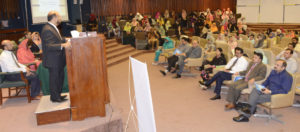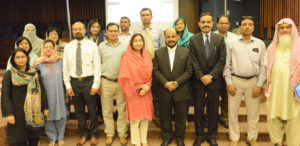 Prof. Dr. Ahmed Yousif Al Draiweesh, President, International Islamic University Islamabad (IIUI) addressing to the participants of the international seminar titled “Challenges of Nation and Education System”, said that uniform education system can bring pivotal change in the societies. Dr. Draiweesh, lauded efforts of Department of Education for organizing the national and international seminars and conferences to highlight the burning issues, challenges in the field of education. He added that how education policies matters to bring change in the society. Discussing madrassa education system, Dr. Draiweesh furthered that subjects related to society and education must be included and there should not be any discrimination between the individual who have studied from madrassa and the one has studied from university. He also acknowledged the contribution of Department of Education by conducting such seminars for enhancing the capabilities of students and the faculty.
Prof. Dr. Ahmed Yousif Al Draiweesh, President, International Islamic University Islamabad (IIUI) addressing to the participants of the international seminar titled “Challenges of Nation and Education System”, said that uniform education system can bring pivotal change in the societies. Dr. Draiweesh, lauded efforts of Department of Education for organizing the national and international seminars and conferences to highlight the burning issues, challenges in the field of education. He added that how education policies matters to bring change in the society. Discussing madrassa education system, Dr. Draiweesh furthered that subjects related to society and education must be included and there should not be any discrimination between the individual who have studied from madrassa and the one has studied from university. He also acknowledged the contribution of Department of Education by conducting such seminars for enhancing the capabilities of students and the faculty.
The 2-day international seminar was organized by the Department of Education, Faculty of Social Sciences, FSS, (IIUI) at Allama Iqbal Auditorium, Faisal Masjid Campus of the University. The research seminar highlighted national challenges/ issues and role of education in addressing these challenges with subthemes: emerging needs and importance of moral education, sustainable development and national prosperity, competition at global level: knowledge economies, ways to improve assessment and evaluation system.
Prof. Dr. Samina Malik, Dean Faculty of Social Sciences highlighted challenges of nation and education system, the needs of society for enhancing quality and demands of education. She emphasized on the inputs and interventions needed to boost up overall capacities of youth as constructive individuals of the society. Prof. Dr. N. B. Jumani, discussed strategies to combat challenges of education system. He also discussed the role of higher education institutions in satisfying the current needs of youth, fulfilling societal needs and relevance of students’ qualification with the current demands of the society.
 Dr. Waseem Malik from York University, Canada discussed “Education and Development: Politics of Knowledge”. He viewed Education and its accessibility as an indicator of success, equality, justice, agency and activism. Education provides employment and it has turned into largest single industry which includes teachers, professors, teaching assistant, researchers, administrators, custodial people, psych & social workers and much more, he added.
Dr. Waseem Malik from York University, Canada discussed “Education and Development: Politics of Knowledge”. He viewed Education and its accessibility as an indicator of success, equality, justice, agency and activism. Education provides employment and it has turned into largest single industry which includes teachers, professors, teaching assistant, researchers, administrators, custodial people, psych & social workers and much more, he added.
Prof. Dr. Anjum Bano Kazimi from Iqra University, Karachi elaborated “ways to ensure effective monitoring systemin educational institutions”. She said that for ensuring monitoring, efficient coordination among all departments and stakeholders at all levels is one of the pre-requisites. Moreover, she stressed on; strengthening national Monitoring & Evaluation (M&E) coordination bodies with mandate and authority, enhancing institutional and individual capacity at all levels and ensuring transparency and accountability of system as recommendations.
Prof. Dr. Iftikhar Ahmad Baig from University of Lahore talked about“Assessment & Evaluation for improving Education”. He suggested to; adoptnew trends and themes of assessment and evaluation in education to achieve the international standard of education, articulate educational goals (both general and specific) more clearly on the basis of assessment and evaluation results, evolve continuous and fair assessment and evaluation which prepares students for the life skills and revise curriculum on the basis of assessment and evaluation results, in order to evince explicitly desired competences, rather than just course objectives.
Dr. Irshad Hussain from Islamia University of Bahawalpur discussed “Need and Importance of Moral Education”. He said that moral education is important as it teaches diversity, tolerance, mutual respect and pluralistic values. Moral Education equips learners with tools of judgment in various situations leading to making responsible choices and decisions. Therefore, moral education should be an integral part of the school and college curriculum, he added.
Dr. Khalid Khurshid from Bahauddin Zakariya University, Multan delivered talk on “Importance of Sustainable Development”. He also explained Sustainable Development Goals (SDGs) devised by UNESCO. While discussing challenges to sustainable development he said Poverty, Unemployment, Climate change, Conflicts and humanitarian aid, Building peaceful and inclusive societies, Building strong institutions of governance, Supporting the rule of law are global in character. A country’s economy becomes more productive as the proportion of educated workers increases, he added.
 Prof. Dr. Riaz-ul-Haq Tariq from National Accreditation Council for Teacher Education, Lahore talked about“Challenges of Higher Education in Pakistan: Personal Experiences and Viewpoint”. He viewed that a good meaningful education is one that provides all learners with capabilities they require to become economically productive, develop sustainable livelihoods, contribute to peaceful living in global societies and enhance individual well-being. He also discussed attributes of graduates (Knowledge, Skills, Attitude and Values) pre-requisite for 21st century world.
Prof. Dr. Riaz-ul-Haq Tariq from National Accreditation Council for Teacher Education, Lahore talked about“Challenges of Higher Education in Pakistan: Personal Experiences and Viewpoint”. He viewed that a good meaningful education is one that provides all learners with capabilities they require to become economically productive, develop sustainable livelihoods, contribute to peaceful living in global societies and enhance individual well-being. He also discussed attributes of graduates (Knowledge, Skills, Attitude and Values) pre-requisite for 21st century world.
Prof. Dr. Rafaqat Ali Akbar from University of Punjab, Lahoredeliberated on“Gender Disparity: the Challenge for Pakistan”. He also explained issues and challenges in gender disparity in education. While discussing suggestions to combat these challenges he suggested focusing on enrolling girls and children for disadvantaged groups, improving quality of education, making the system responsive to gender and social equity issues, elimination of Social Biases and motivating & training the teachers.
Prof. Dr. Muhammad Khan from IIUI talked about “Preparing Future Educational Leadership for Pakistan”. Education is the foundational tool to steer a nation towards economic and social development that makes the role of an Educational Leader phenomenal. Decisions of the leaders impact the life and future of generations to come; hence, setting them apart from other kinds of leadership roles that is mostly involved with the organization’s internal hierarchy, he added.
Dr. Shamsa Aziz, Chairperson, Department of Education (Female Campus) shared initiatives of Department of Education. Dr. Muhammad Munir Kayani, Chairman, Department of Education (Male Campus) thankedkeynote speakers, guests, Deans, Directors and Students for their participation in this seminar.It was 4th seminar in the seriesand rest of three were held in 2018.This interactive seminar was attended by Deans, Directors, Faculty members, Research Scholars and students of the varsity.
During the tow day international seminar a large number of faculty members and students from the faculty of social sciences took part in the detailed discussions sessions with education experts while, renowned scholars highlighted important role of educationists for brining change in the society.

